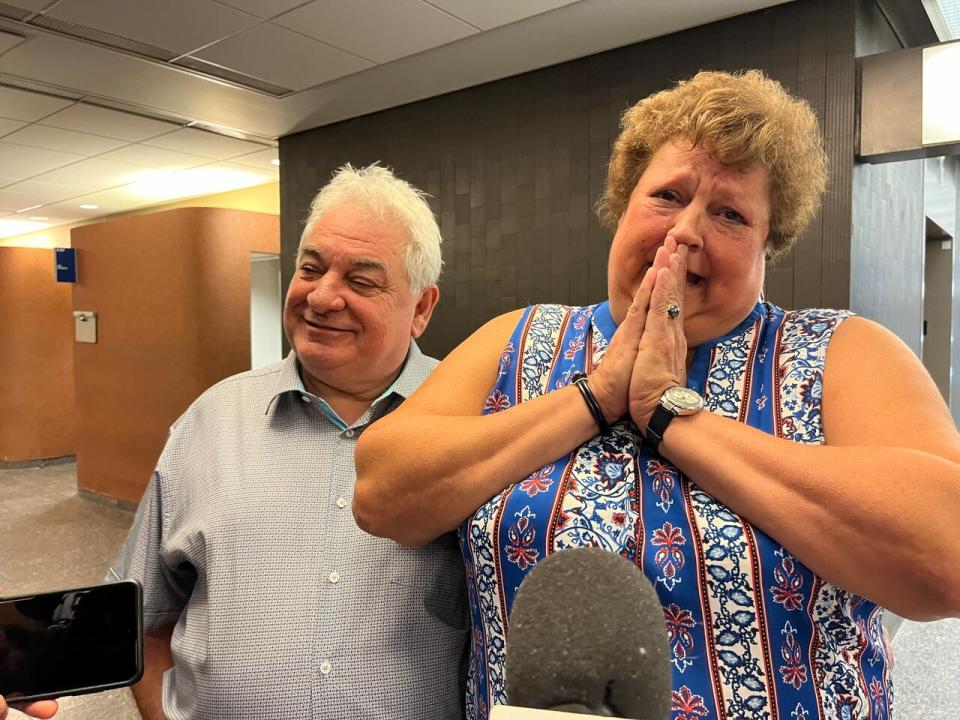Randy Tshilumba found guilty of 1st-degree murder in 2nd trial for Maxi clerk stabbing

A jury has found Randy Tshilumba, 27, guilty of first-degree murder in the 2016 stabbing death of a supermarket cashier — the same verdict handed down in his first murder trial back in 2017.
In April 2016, Tshilumba repeatedly stabbed 20-year-old Clémence Beaulieu-Patry in broad daylight at the Maxi grocery store where she worked, in Montreal's Saint-Michel neighbourhood.
Tshilumba pleaded not guilty to first-degree murder, but the prosecution and the defence both agreed that he stabbed Beaulieu-Patry. Tshilumba's lawyers argued that he was not criminally responsible for the death.
The jury's guilty verdict came Monday after three days of deliberations.
In his first trial in 2017, Tshilumba was found guilty of first-degree murder and sentenced to life in prison without possibility of parole for 25 years.
In a judgment rendered in November 2022, Quebec's Court of Appeal overturned the conviction and ordered a new trial, saying the judge in the first had given the jury instructions that were "unduly long, unnecessarily complex but above all manifestly contradictory and prejudicial."
Tshilumba, 19 at the time of his arrest, admitted to killing Beaulieu-Patry, saying he acted in self-defence because he believed the woman and four of her friends had been plotting to kill him for more than a year before the stabbing.
Tshilumba's defence lawyer had argued his client should not be found criminally responsible because of mental illness.
The same defence was presented to the jury in the second trial, but the jury again sided with the Crown which presented excerpts from notes the accused had taken on his cell phone — they included sentences like: "invent a solid story for the police" and "how to commit a perfect murder."
During the first trial, psychiatrist Dr. Louis Morissette concluded that the accused was suffering from a paranoid delusional disorder and believed he was being persecuted by Beaulieu-Patry.
'This is a femicide,' says Crown
Morissette has since revised his diagnosis and determined that Tshilumba was instead suffering from paranoid schizophrenia.
But the prosecution's theory was that the crime was no "accident," according to Claude Berlinguette-Auger, prosecutor for the Directeur des poursuites criminelles et pénales (DPCP), after the hearing.
"It wasn't motivated by a mental health problem. It was someone who had actually tried his luck with Clémence, who hadn't been successful," she told Radio-Canada.
"Absolutely, this is a femicide. Violence against women must be severely punished," she added.

Luc Patry and Nathalie Beaulieu, the victim's parents, are feeling relieved after the verdict of Randy Tshilumba's second trial. (Valérie-Micaela Bain/Radio-Canada)
Nathalie Beaulieu, the victim's mother, said the second trial was, at times, worse than the first one because the family had been trying to rebuild itself after the first one.
"We'd achieved a little more gentleness in our lives over the past seven years," she said.
But this second trial also brought comfort to the victim's parents.
"It's a great relief to know that he's going back to prison and that he'll pay his sentence for shattering our lives, for taking Clémence's life.… Clémence can rest in peace," said Beaulieu.

 Yahoo News
Yahoo News 
